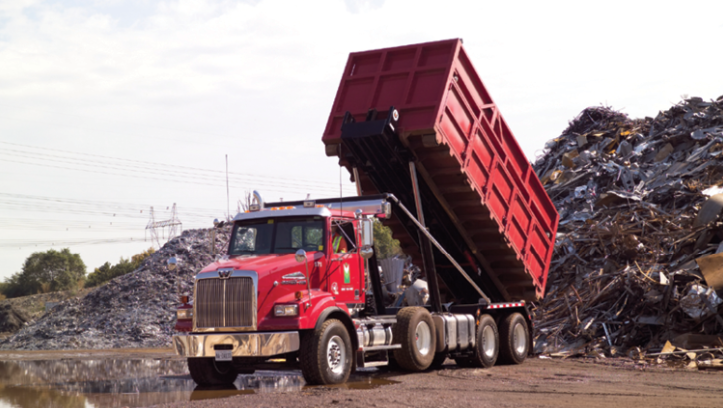Brampton, Ontario-based Triple M Metal LP is an impressive company within its own right. The firm garnered more than $1 billion in revenue in 2017, buying, processing and selling scrap metal from 26 locations in Canada, the United States and Mexico.
At the same time Triple M founder Mike Giampaolo and his brother Antonio (Tito) have been leading that company through four decades of growth and forward momentum, they also have helped to assemble the Giampaolo Group of Cos. That portfolio of firms includes Triple M; secondary aluminum producer Matalco Inc.; electronics recycler GEEP (Global Electric Electronic Processing); steel distribution center operator Venture Steel; and Giampaolo Investments Ltd., which engages in financing, asset management and property management aspects that affect the Giampaolo Group as a whole.
Giampaolo Group CEO Joe Caruso says a culture of business planning based on the “years of combined knowledge and experience” found in the company’s leadership team has helped put Triple M and the Giampaolo Group atop Ontario’s recycling sector and to create a continentwide footprint.
Pumping up the volume
Triple M Metal President Oscar Moniz describes the scrap firm’s growth as a steady, decades-long process that involved transforming from “a small family-run business to become Canada’s largest recycler and processor of scrap metals.”

He continues, “We have grown both organically—through investment in new yards, equipment and technology—and through strategic acquisitions.”
Giampaolo and the company’s other managers have “achieved such impressive growth over the years through a dedication to first-class service, long-term strategic planning, competitive pricing and a commitment to creating value-added partnerships with our customers,” Moniz says.
Triple M, Caruso says, “was founded on an ‘earnings culture’ based on continuous improvement, eliminating waste, extracting value and realizing efficiencies for our customers wherever possible.”
The result has been a North American network of 26 locations and annual revenue that topped $1 billion in 2017.
Giampaolo Group Chief Operating Officer Chris Galifi says, “Triple M Metal handles over 3 million tons of ferrous and 300,000 tons of nonferrous scrap each year.” Geographically, he adds, “We do business in all 10 Canadian provinces, over 20 U.S. states and five Mexican states.”
The company’s four shredding plants chew through more than 50,000 net tons per month of infeed material. The shredders are in Brampton, Hamilton and Sault Ste. Marie, Ontario. “Our state-of-the-art nonferrous downstream separator [in Hamilton] processes 25,000 net tons per month (300,000 tons per year) of shredder residue, recovering zorba (aluminum), stainless steel (zurik) and insulated copper wire, thus reducing the amount of waste headed to landfill,” says Triple M Vice President of Nonferrous Trading Michael Commisso.
“We also process over 35 million pounds (17,500 tons) of insulated wire per year at our chopping line,” he says of a Triple M operation also in Brampton.
The company seeks scrap from every level of the collection chain. “We source scrap from every segment of the market, from local peddlers to multinational industrial generators,” Moniz says.
The grades the company produces often stay within North America, but, Moniz says, “Triple M also sells on a global scale, selling to Europe, Asia and Turkey.” In all buying markets, he says, “Consumers value Triple M’s significant footprint and the amount of volume we are able to offer.”
Integrating in multiple directions

Even with the effort and energy it has taken for Triple M to attain its global status, Giampaolo and his management team also have assembled a portfolio of sister companies with either a recycling or metals industry tie-in.
Among the fastest growing of those companies this decade has been Matalco, a secondary aluminum producer with a direct connection to some of the aluminum scrap Triple M processes. Matalco produces what Caruso calls 6000 series, extrusion-grade aluminum billet “manufactured primarily from recycled aluminum.”
Matalco’s headquarters and a billet production facility are in Brampton. It selected Ohio as its initial base of operations in the U.S. Metalco operates two secondary aluminum billet facilities in the state, one in Canton and the other in Lordstown (near Youngstown). In January 2018, it purchased the former Alexin secondary production facility in Indiana.
The Lordstown plant, Matalco’s newest, can produce up to 175,000 tons per year of secondary billet, while the Brampton plant can produce 125,000 tons per year and the Canton facility about 65,000 tons per year. The acquired Alexin plant can produce about 112,000 tons annually.
“Matalco allows Triple M to view aluminum scrap material through the eyes of a consumer rather than just a metals recycler,” Caruso says. “The two companies provide a vertically integrated, closed-loop approach to aluminum scrap procurement and billet production that ensures Triple M can offer our customers the best price for their aluminum commodities.”
Giampaolo Group also has vertically integrated on the ferrous side, moving into the steel service center sector with the creation of Etobicoke, Ontario-based Venture Steel in 1997. “Venture is a processor and distributor of flat-rolled steel products with four processing facilities in Canada and Mexico,” Caruso says.
Together, Triple M and Venture can provide manufacturers with what Caruso calls “a full line of flat-rolled steel products in conjunction with scrap metal services. The two companies share the same customer bases and provide one another opportunities for synergy and growth.”
In 2011, the Giampaolo Group entered the electronics arena, purchasing a majority stake in Barrie, Ontario-based GEEP. That firm collects, refurbishes, disassembles or shreds obsolete electronics. It has nine locations: six in Canada, two in the U.S. and one in Costa Rica.
Tools of the trade

Throughout its history, Triple M and the Giampaolo Group have adhered to a range of operational techniques and management philosophies that the group’s managers say are crucial to profitability.
In a decade when freight costs and service have become an industrywide woe, Triple M Vice President of Ferrous Trading Michael Hlacar says the firm has long paid close attention to this aspect of the business. “Freight is often the largest expense (as a percent of product value) in the scrap metals industry,” he says. “As a result, we employ a wheel-and-spoke model at all of our locations, setting up shop strategically close to our consumers and suppliers in order to use transportation resources as efficiently as possible.”
The company also does its best to control the freight service realm. “Triple M Metal’s private truck and container fleet is one of the largest in North America,” says Steve Leddy, the company’s mill service vice president. “All of our trucks are equipped with GPS tracking, enabling our dispatch to monitor our fleet in real time. The system alerts us in the event of idling or poor route efficiency, in line with our core values of reducing waste and ensuring our supply base receives first class service.”
On the rail side, Leddy says, “Triple M is home to a private fleet of 150 high-capacity rail cars that help to reduce outbound freight costs for our customers.”
Whether employees and managers are dealing with processing, trading or freight issues, Moniz says good hiring and training methods are crucial. “Triple M Metal believes strongly in leadership building, cultural fit and performance-based compensation for all of our 1,000-plus employees.”
He continues, “All new hires attend ‘TMM University,’ an extensive program that spans all aspects of the business. This training gives new employees a strong foundation for their future careers within the company and affords management the opportunity to recognize leadership potential and assess where a new hire’s talents are best suited.”
A good culture yields a tenured workforce, Moniz says, but that does not mean the firm falls into habits and routines. “Our company utilizes a collaborative culture that combines all of our individual expertise in order to create a customized approach to scrap management for our clients.”
Triple M’s operations revolve around what Caruso calls “a data-driven approach to scrap marketing: We believe that if you can’t quantify something, you can’t improve it. As a company we are constantly evaluating processes and procedures to ensure maximum returns are being generated for our scrap portfolio.”
Attention to profitability and customer service are critical in all market conditions, Moniz says. “We avoid the commoditization trap for our products and services by having the customer’s needs at the core of our strategy.”
Regarding the future, Caruso says, “Triple M will continue to invest in new technologies and opportunities that make us unique and add value to our supply and customer base.”
Source: https://www.recyclingtoday.com/article/triple-m-metals-canada-profile/

